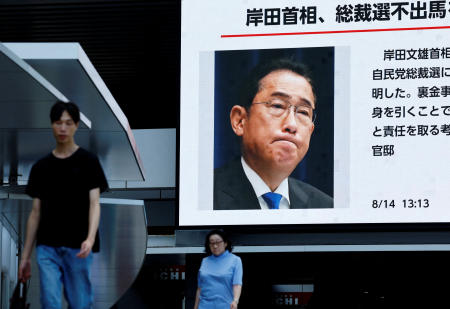
- ARAB NEWS
- 31 Jul 2025

TOKYO: Following Japanese Prime Minister KISHIDA Fumio’s announcement that he will step down next month, many people in his political home of Hiroshima voiced disappointment Wednesday.
Kishida, who heads the ruling Liberal Democratic Party, abruptly announced that he will not seek re-election in the LDP presidential race next month.
“I think he always had his home ground in mind, hosting the Group of Seven summit in Hiroshima in May last year,” said Haruka Nishioka, 29, a resident of Oyama in the eastern prefecture of Tochigi who is visiting relatives in the western city for holidays.
“I think (the G-7 summit) had a massive impact, as there are a lot more tourists,” Nishioka said.
A lawmaker elected in the atomic bombed city, Kishida has consistently pushed for a world without nuclear weapons as prime minister.
A 56-year-old corporate employee from Hiroshima said, “I don’t think he was able to gain (global) support, considering the lack of major developments on nuclear abolition.”
“I’ve urged (Japan) to sign and ratify the Treaty on the Prohibition of Nuclear Weapons as a hibakusha atomic bomb survivor but has been unsuccessful,” stated Toshiyuki Mimaki, 82, who heads the Hiroshima Prefectural Confederation of A-Bomb Sufferers Organizations.
He added that he wanted Kishida to “properly discuss” the matter.
Many people outside Hiroshima were resigned to the change in the country’s leader.
In Tokyo’s Ginza district, corporate worker Taishi Sashikubi, 33, said, “I think (Kishida) had very little choice but to give up on running (in the LDP election), given the low cabinet approval ratings.”
“I don’t think anything will change regardless of who becomes the next prime minister,” said Keiko Shirasugi, 68, who lives in Koganei, Tokyo.
Takuya Yokota, who leads a group of families of Japanese nationals abducted by North Korea decades ago, said that Kishida’s decision was disappointing as behind-the-scenes negotiations to resolve the serious human rights issue will be reset, meaning that the abduction victims will face an even longer period of hardship.
Yokota’s sister, Megumi, was abducted to North Korea in 1977 when she was 13.
JIJI Press